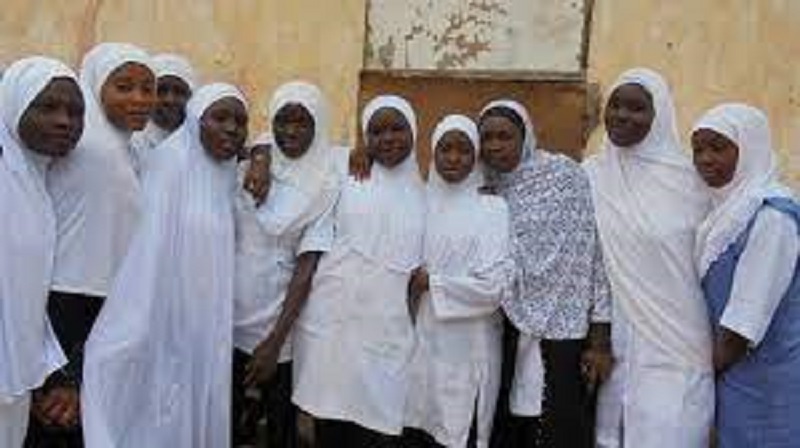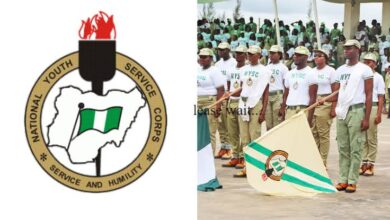WAEC Literature Questions and Answers 2022

Today’s Literature WAEC 2022 Questions and Answers (16th June 2022): Today Answers Loading…
Keep Refreshing
Please note that we provide the WAEC 2022 Literature Questions and Answers, as well as any other WAEC Expo, for free. We are aware that many websites charge students money in order to provide WAEC Literature in English Answers 2022. Free WAEC questions and answers are available. We will do the same for other exams, such as NECO.
WAEC LITERATURE OBJECTIVES (OBJ) ANSWERS LOADING
2022 VERIFIED Literature WAEC OBJ Answer getting ready 100%:
Literature Obj!
1AADBDDCDBD
11DBBDDBBDCC
21CACBBABDCC
31DBBDBBABAC
41BDAACACBCA
Completed
WAEC Literature Drama Answers 2022 (Literature 2022 Drama Answers Loading)
Literature WAEC Answers 2022
Today’s WAEC Literature Theory Questions and Answers 2022 Ready…
Please do not panic and fall into the right hand. WAEC 2022 Literature Answers will be posted for free here once ready.
We are right now getting things ready for you. The WAEC 2022 Literature in English theory questions and answers will be posted any moment from now. All you need do is to keep refreshing this page until you see the answers.
WAEC Literature 2022 Drama & Poetry Now Ready
Please Remember to rephrase
LITERATURE (DRAMA & POETRY)
(NUMBER 11)
The poem’s persona atmosphere has a relaxed and hopeful tone to it. The poet’s attitude toward the subject of love is passionate and hopeful about his relationship with his love.
The poet laments bitterly the life he led before meeting his current love because he sees it as a waste of effort, time, and energy at the start of the poem. He refers to such pointless experiences as “childish” and “play.” Because he was completely unaware of himself when the love was consummated, his previous love (relationship) cannot be considered genuine. Because it makes the lovers immortal, the union in question is more self-sufficient and perfect than hemispheres.
It’s likely that the persona’s previous love life was a shambles and full of deception, in comparison to the newfound love, which is more perfect than life itself. The poet then goes on to use conceit to compare himself and his beloved, using the far-fetched metaphor of “Seven Sleepers Den” to express that their entire lives had been meaningless and unconscious. If they had any fort of pleasures and joy, it was all a figment of their imagination. “If ever any beauty I did see; which I desired, and got it’ was but a dream of thee,” the poet writes in praise of his beloved.
Continue With WAEC Literature 2022 Drama & Poetry Answers
(10)
The poem addresses Africa’s leadership crisis, as well as the lingering problem of our inability to find a credible and transparent leader who is brave, courageous, fearless, and compassionate, due to a lack of trust. The forest animals in the poem don’t trust one another to take over as the animal kingdom’s leader. “When the zebra asserts his right to lead, the pack points to his striped duplicity.” “The elephant trudges into a power struggle/but his fellow elephants fear his trampling feet”… Consequently, despite their facial qualifications, the zebra and elephant are unfit to rule because they lack good leadership qualities.
The African masses, on the other hand, do not trust one another to take over the country’s leadership role. This lack of trust is caused by religious and ethnic diversity, with a Hausa man preferring to vote or bequeath power to his fellow brother regardless of leadership quality, whereas an Ibo man believes that only his brother, who is a Christian and belongs to the Ibo tribe, is capable of leading.
Also, the king of the jungle believes he is capable of leading, but when a loyal follower recalls his ferocious (violent) nature and how he unleashes it on the weaker animals, he reconsiders his attitude toward him. Even hyenas and giraffes are unable to lead because they lack both vision and trust.
It is clear from this poem that it is to blame for underdevelopment not only in Africa, but also in Nigeria. The animals aren’t united enough in the poem to stand up to the lion, who “…stakes his claim to leadership of the pack.” Because the led, that is, the followers, do not have one voice and cannot change their situation, his dominance and ability to lord it over and subdue other animals cannot be properly checked. Hyena claims he is qualified and credible enough to lead the animal kingdom to new heights, but impalas claim he is unable to do so due to his deadly appetite for dead animal meats. The animals are at odds with one another because they can’t agree on who should lead them. This lack of unity and oneness among the animals is comparable to the lack of unity among African leaders and the masses. This is largely due to the religious and ethnic diversity of the masses, which explains why they are unable to choose a qualified leader from among themselves and instead must band together against the ruling class in order to wrest power from them.
The persona tries to suggest a likely solution to the problem of disunity among our leaders near the poem’s end. “A good leader should be “tough as a tiger, compassionate as a doe / transparent as a river, mysterious as a lake,” according to the author. A leader who possesses the aforementioned quality can inspire people to strive for change and unity.
Literature in English Drama & Poetry Continuation
Number 12
THEME OF SUFFERING
The “Journey of the Magi” is a one-of-a-kind journey. It all starts and ends with pain, and the Magi have a lot of it along the way, what with all the bad weather and even worse people. But there’s more suffering going on here than meets the eye. There’s the psychological anguish of the dying Magi culture, as well as the physical and mental anguish we know Jesus will face as he grows up to become Christ. So, how do we interpret all of this? We believe Eliot is reminding us that much of spirituality and religion is based on suffering, and that suffering is frequently associated with religious transformation.
The theme of suffering is unmistakable in the poem, and it is linked to other themes.
Death is one of the aspects of the theme of suffering that is depicted. The loss of their traditions to impending Christianity is akin to staring death and defeat in the face at the same time for the Magi. Death doesn’t show up until the very end of “Journey of the Magi,” but when it does, it puts a fine point on what the arrival of Jesus means to the Magi and their people.
Religion is yet another aspect of the poem’s theme of suffering. The birth of Jesus, the three kings, and a plethora of Biblical allusions Religion is written all over “Journey of the Magi,” and that’s just the obvious stuff. Because the poem is about the arrival of Christianity, each word is dense with religious connotations that can be sifted through with a fine-toothed comb. Allow Shmoop to take over.
In the poem “the journey of the Magi,” fear also promotes the theme of suffering. In “Journey of the Magi,” there are two distinct layers of terror. First, there’s the fear of the Magus as a character – the kind that’s pretty obvious by the end of the poem. Then there’s the type of fear that the first type implies. Now, before you start wondering what Shmoop is talking about, let us explain: Eliot is secretly telling us about his own fears surrounding his recent religious conversion by making the Magus a character who is extremely wary of spiritual change. After all, Eliot grew up without much of a spiritual upbringing, and while his conversion to Anglicanism was undoubtedly his choice, it did not come easily. Which is perhaps why, in this poem, fear is unleashed with all guns blazing.
The poem also discusses the suffering of tradition. Traditions are being questioned left and right in the “Journey of the Magi.” The birth of Jesus evokes a strange sense of impending doom, as well as the realization that the Magi’s old way of life is long gone. You’d think that a poem about Jesus’ birth would be overjoyed at the prospect of ushering in a new era of religious awe, but this poem is mostly lamenting the loss of a long-gone era. Eliot, it’s me, Eliot, Eliot, Eliot, Eliot, Almost every time he drank, his glass was half-empty. If not completely shattered.
It is clear that the poet used a variety of themes to explain the theme of suffering, which is the most Dominant.
LITERATURE 2022 WAEC (DRAMA & POETRY)
(6)
Since his wife reminds him of everything he despises from the beginning, Jimmy attacks Alison both verbally and physically throughout the play. Jimmy verbally assaults Alison and her family members because he wants her to respond to a question about a newspaper article, which Alison denies because she has not yet read it. He humiliates and attacks Alison and her brother, Nigel.
Alison, in contrast to Jimmy, does not respond directly to Jimmy’s aggressive behavior. She prefers to keep her mouth shut. She understands that if she responds to his attack in any way, he will win. Alison’s apparent ignorance and silence can also be used as a weapon to protect her from Jimmy’s assaults. Jimmy doesn’t just attack Alison; he also targets her family and friends. “Militant, arrogant, and full of malice,” he says of her parents.
He labels her friends “sycophantic phlegmatic and of course, top of the bill pusillanimous.
Jimmy also despises Alison’s mother for her dedication to her middle school classrooms and her fear of her daughter marrying a man of lower social status, to the point where she hired a detective to keep an eye on Jimmy because he doesn’t trust him. This irritates him because he values middle-class values. As a result, he refers to Alison’s mother as a “old bitch” who should be dead.
As a result, Jimmy’s rage at every member of the cast can be traced back to his difficult upbringing and the loss of his childhood. Because he claims he was exposed to death, loneliness, and pain at a young age, Jimmy is frail and insecure.
LITERATURE 2022 WAEC (DRAMA & POETRY)
(8)
Gabriel, also known as Gabe, is Troy’s mentally disturbed brother. He was injured in the Second World War and required a metal plate to be surgically implanted into his head due to a head injury. He receives a check from the government, which Troy used to purchase the Maxson’s home, which serves as the play’s setting. When Gabriel wandered around the neighborhood singing and carrying a basket, he provided some comic relief. On Judgment Day, he imagines himself as the angel Gabriel, who, with his trumpet, opens the gates of heaven for Saint Peter.
However, shortly before the play begins, Gabriel has moved in with a lady named Miss. Pearl, and Troy, fearful of losing Gabe’s disability check, commits him to a mental institution and continues to receive half of Gabe’s check.
LITERATURE (DRAMA & POETRY)
LITERATURE (DRAMA & POETRY)
(4)
A playwright’s device in which the characters of a play perform brief dramatic sketches during the course of the play is known as a play-within-a-play. In “The dance of the lost traveler,” it is used as a form of flashback to enact the experience of the Lagos visitor. The audience gets a glimpse into the ordeal of the first-time visitor to Lagos, who has car problems and has to abandon it in order to continue his exploration on foot.
The second play dramatizes Baroka’s bribery of the surveyor in order to divert the railway track away from llunjunle.
The third play is titled “The dance of virility used to mock Baroka,” and it consists of a mix of music, mime, and movement intended to entertain the characters.
(7)
Troy, whose income is insufficient to meet his family’s needs, is preoccupied with dragging the family name into the mud.
As a result, Troy struggles to fulfill his responsibilities as a father and husband to his wife. Before his death, he does not accomplish much. As his son Cory turns against him and becomes a rebel, the family he ruled with an iron hand or harshness is torn apart. He vows not to attend Troy’s funeral after leveling serious criticism on how Troy tormented his life and dreams for a better future.
Troy’s adulterous act with Alberta, Cory laments bitterly, contributes to Troy’s backwardness and family disintegration. Because Rose has vowed never to have anything to do with Troy, especially when news of Alberta’s pregnancy for “Troy” comes in, the nature of trust between Rose and Troy is broken here.
“Your daddy wanted you to be everything he wasn’t… and at the same time he tried to make you everything he was… he meant to do more good than he meant to do harm,” Rose cautions Cory, demonstrating Rose’s embodiment of unity and family rebirth. Troy sees Rose as a good woman who can bring the family together when he says…
Rose also forgives Troy and agrees to raise Raynell, Troy and Alberta’s illegitimate daughter who died shortly after birth, in order to promote peace, harmony, and family integration in the Maxsons.
WAEC LITERATURE 2022 Answers (DRAMA & POETRY)
(3)
The primary conflict in the play is the contrast between tradition and modernity in the aftermath of early colonialism. The conflict between Baroka and Lakunle for Sidi’s hand in marriage represents the Yoruba customs in opposition to a western conception of progress and modernity. Lakunle, who represents the modern Nigerian man, dresses in Western attire, speaks and acts like an Englishman, and was presumably educated in a British school. His greatest ambition is to transform llunjunle into a modern paradise akin to Lagos. He actively despises his village’s traditional customs and the people who support them. When Lakunle refuses to pay Sidi’s bride price, this is best exemplified.
He goes on to say that the bride price is “an ignoble customs, infamous, ignominy / sharing our heritage before the world” and that “paying the price would be / buying a heifer off the market stall / you’d be my chattel, my mere property.” This implies that Lakunle equates such behavior to a simple process of buying and selling goods and commodities, which is in direct opposition to his Western conception of marriage. Because of Lakunle’s refusal, converting Sidi to his way of thinking, views, and ideas into a “modern wife” is far more important than marrying her. “Within a year or two, you’ll have machines that can do / without getting in your eyes.” “Sidi, I do not seek a wife / To fetch and carry / To cook and scrub / To bring forth children by the gross; I seek a life-companion,” Lakunle says, “I do not seek a wife / To fetch and carry / To cook and scrub / To bring forth children by the gross; I seek a life-companion.”
On the other hand, Baroka is an anti-modernist who is adamant about preserving the village’s traditional way of life. Baroka paid off a surveyor not to build train tracks through the outskirts of llunjunle, preventing the village from experiencing the modern world, according to Lakunle, who finds Baroka’s lifestyle and views archaic. Baroka also shows that he does not despise modernity or progress, and that he does not want it imposed on him or the village’s way of life distorted in the name of civilization and progress. Baroka wishes to add Sidi to his many wives, all of whom are fully accepted by the land’s customs, whereas Lakunle fantasizes about having only one wife, as dictated by western culture. Sidi will become the head wife of the new Bale when Baroka dies, according to tradition, making her one of the most powerful women in llunjunle. She opts for traditional marriage as soon as she realizes that modern marriage may make her less powerful due to fewer rights. Baroka wins the fight for Sidi’s hand in marriage in the end. This demonstrates that African ways of life continue to reign supreme over Western culture, which appears to be more complex, complicated, and incomprehensible.
The play investigates the clash of two distinct cultures, specifically the conflict between African and European customs or ways of life, as well as traditional and modernity. As the selfish Baroka bribes the surveyor to divert the railway track away from llunjunle, thereby foiling the intended progress in the village, the proponent of traditional culture tries hard to prevent the advent of western civilization and foreign values into the village. This clash can also be seen when a visitor from Lagos (Photo Journalist), the birthplace of western civilization, makes the indigenous culture less appealing by causing a stir during his visit to llunjunle. His camera is described as a “one-eyed box” and his car as “the devil’s own horse” by the public. Sidi’s ego is boosted by the photographs on the cover and inside of Lagos Man’s Magazine, and she almost forgets about her relationship with Baroka as her growing fame takes precedence.
WAEC LITERATURE DRAMA & POETRY A
(1)
The attitude of men toward women can be seen in the characters of Lamboi, Musa, and others in Yoko’s chiefdom, as well as in the spate of betrayal, cheap blackmail, and deception. For example, in order to prevent a woman from assuming the enviable position of chief in Senehun, Lamboi, Yoko’s blood brother, conspires with Musa, the seer and medicine man, to assassinate chief Gbanya when it is clear that he will pass the power to his wife. As a result, Yoko Lamboi instructs Musa to do it, and when he refuses, he is fired. Lamboi threatened to reveal Musa’s dark past, which includes the murders of Yattah’s son and Mama Kidi’s daughter.
Because Musa has a priest-like role to play as one who is supposed to protect the land and Gbanya, the chief of Senehun, the thought of being exposed to the general public propels Musa to betray the chief and the entire community.
Musa, on the other hand, continues his nefarious activities with his accomplice Lamboi. This time, Yoko’s strategy is to not only make Moyamba uncontrollable for her, but also to implicate her and turn the public against her. Lamboi collaborates with Musa to kidnap and murder Ndapi and Jilo’s daughter. When it’s completed, both will incite women and others to revolt against the Queen. The public would be reliably informed that Yoko used her as a sacrifice in order to gain more power so that the Governor would be at her beck and call and her reign would be rendered useless and unstable.
NUMBER (2)
GBANYA AS A REMARKABLE CHARACTER
Even when they disagree, Beneatha appreciates his peaceful demeanor and calm demeanor. Asagai appears to be Beneatha’s savior from the potential tragedy of her eventually becoming George’s wife, in contrast to George Murchison’s abrasive put-downs of Beneatha and George’s insistence on maintaining his narrow-minded views. To put it another way, Asagai is helpful and concerned about others’ well-being. He offers Beneatha much-needed consolation and sound advice when she is at her lowest point, and he volunteers to help with the move to Clybourne Park. He counsels Beneatha spiritually and emotionally, helping her to get back “on track” as she rails against her brother’s foolishness in having lost the money.
He is persistent but never overbearing, and he was used in the play to make a radical point about race. He flatters her with gifts (which George Murchison has not done); additionally, Asagai’s gifts are not meaningless trinkets, but items that are both useful and desired by Beneatha, such as the Nigerian robes for which he clearly went to great lengths. Asagai’s compliments to Beneatha are genuine, making them credible.











